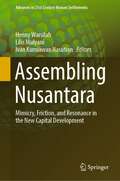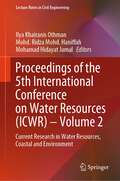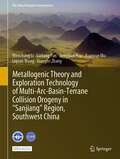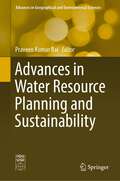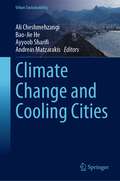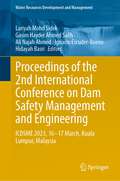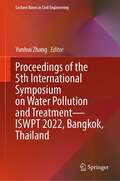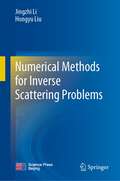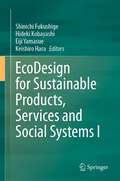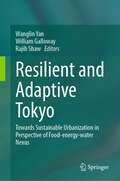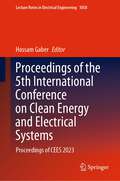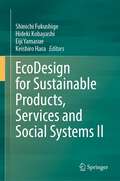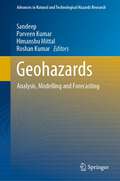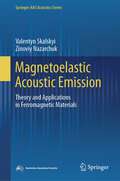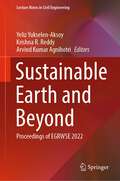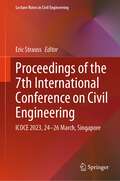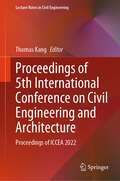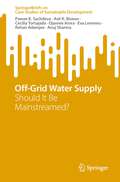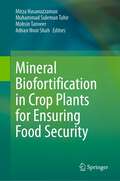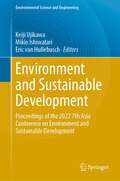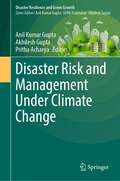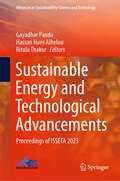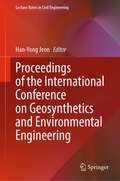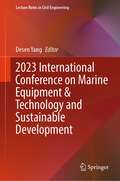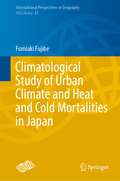- Table View
- List View
Assembling Nusantara: Mimicry, Friction, and Resonance in the New Capital Development (Advances in 21st Century Human Settlements)
by Lilis Mulyani Henny Warsilah Ivan Kurniawan NasutionToday, the new Indonesian capital city, Nusantara, planning is being anticipated as “representing national identity,” “a model city,” or “a gift to the world,” and many other extraordinary labels. This book examines the reality of an ongoing developmental transformation of the Nusantara beyond those labels. It approaches its assemblage of humans, their works (plans, documents, policies, and others), non-human objects (biodiversity, landscape, geography, physical infrastructure, buildings, and public spaces), processes, social relationships, social infrastructures, and others. It is organized into three themes—mimicry, friction, and resonance. The mimicry illustrates the similarities (and differences) between Nusantara and other capital cities in urban narratives, imageries, and forms. The friction studies how Nusantara moves actors who do not always agree, processes that do not always align or collaboration between diverse contradicting groups that intersect. The resonance observes how Nusantara resonates with, yet communicates its voice toward, the world. The three concepts (originated from geography, anthropology, and sociology) frame the analytics of the various contributions of local and foreign scientists from multiple disciplines. Overall, the book recommends “Otorita Ibu Kota Nusantara” (Nusantara capital city authority) on the current experimentation and implementation of the urban vision and provides a reference for social scientists to study Nusantara. And more broadly, the book offers the current socio-spatial practices of capital city-making in Asia that are valuable for the region.
Proceedings of the 5th International Conference on Water Resources: Current Research in Water Resources, Coastal and Environment (Lecture Notes in Civil Engineering #365)
by Ilya Khairanis Othman Mohd. Ridza Mohd. Haniffah Mohamad Hidayat JamalThis book comprises selected proceedings of the 5th International Conference on Water Resources 2021 (ICWR 2021) focusing on innovations and preparations to face the water-related challenges. Focus is given in the area of quantitative and qualitative water resource analyses comprising forecasting, modeling, and water governance. The contents are useful to researchers, educators, practitioners, and policymakers alike.
Metallogenic Theory and Exploration Technology of Multi-Arc-Basin-Terrane Collision Orogeny in “Sanjiang” Region, Southwest China (The China Geological Survey Series)
by Wenchang Li Guitang Pan Zengqian Hou Xuanxue Mo Liquan Wang Xiangfei ZhangThis open access book presents a new structural model of “multi-arc-basin-terrane system” based on the in-depth research of the Nujiang-Lancangjiang-Jinshajiang region, especially several Paleo-Tethys ophiolitic mélange belts and sets of arc-basin systems, and a new orogenic model of “The Hengduan shan Mountains” based on penetrated research on spatial-temporal framework and orogenic models of different orogenic belts under large-scale strike-slip-shear-nappe structures evolution. The authors paid special attention on the coupling relation between orogeny and metallogenesis. The metallogenesis and dynamic process are probed under the crust–mantle interaction and material-energy exchange-transmission background and the tectonic units evolution. The ore genesis and distribution of deposits have been thoroughly analyzed, and the metallogenic theories of "multi-arc-basin-terrane" and "intracontinental tectonic transformation" in the Nujiang-Lancangjiang-Jinshajiang region have been carried out. This book also illustrates how to explore metallic deposits in the Nujiang-Lancangjiang-Jinshajiang region by using the metallogenic regulations. Meanwhile, this book has high reference value for researchers working in the fields of basic geology, environmental geology, and energy geology.
Advances in Water Resource Planning and Sustainability (Advances in Geographical and Environmental Sciences)
by Praveen Kumar RaiSustainable water resources planning deals with the interface of water resources science and the needs of human populations. It highlights works that addresses practical methods and basic research in, for example: quantity and quality management of groundwater and surface water resources; sustainability of water resources and water availability; water use and reuse including managed aquifer recharge and storage; geopolitical and socio-economic aspects of water resource management; water development and human activity impacts on ecological systems and human health, including, for instance, agricultural and climatic impacts, subsurface waste storage and injection, geothermal energy development and subsurface energy storage. This book provides up-to-date systematic and scientific analyses of such water problems and suggests sustainable measures to overcome them through effective surface and sub-surface water resource management. It is immensely valuable to students, researchers, water resource managers, hydrologists and all those who are engaged or interested in any aspect of river water conservation and management of water resources.
Climate Change and Cooling Cities (Urban Sustainability)
by Ali Cheshmehzangi Bao-Jie He Ayyoob Sharifi Andreas MatzarakisThis edited book provides a solid foundation for future research on cooling cities, climate change impacts on cities and urban environments, and innovative mitigation and adaptation strategies. With ever-increasing climate change impacts on our living environments and continuous calamities and natural disasters around the world, we urge for new approaches, apt action, and adequate support to boost cooling strategies for the built environments. To achieve this goal, research, practice, and policy could do much more to provide us with new pathways to achieve sustainable development. This book is a comprehensive collection of theoretical perspectives and global case study examples focused on three core areas of (1) concepts, theories, and trends, (2) mitigation and adaptation strategies, and (3) policies. The book is of use to various stakeholders and more importantly to urban specialists, planners and designers, policymakers, academics, practitioners, and developers. We urge them to mitigate climate change before it gets too late. We are confident the book could provide readers with new ideas, strategies, and directions that could lighten up the path toward new actions, policies, and innovation.
Proceedings of the 2nd International Conference on Dam Safety Management and Engineering: ICDSME 2023, 16—17 March, Kuala Lumpur, Malaysia (Water Resources Development and Management)
by Lariyah Mohd Sidek Gasim Hayder Ahmed Salih Ali Najah Ahmed Ignacio Escuder-Bueno Hidayah BasriThis book presents peer-reviewed articles from the 2nd International Conference on Dam Safety Management and Engineering (ICDSME 2023), organized by the Malaysian National Committee on Large Dams (MYCOLD), Tenaga Nasional Berhad (TNB), Department of Irrigation and Drainage (DID) and Universiti Tenaga Nasional (UNITEN). With the theme “resilient dams for resilient communities,” the conference highlights dam safety and engineering issues by together dam professionals and experts around the world to discuss, reflect and share their experiences in addressing these issues.
Proceedings of the 5th International Symposium on Water Pollution and Treatment—ISWPT 2022, Bangkok, Thailand (Lecture Notes in Civil Engineering #366)
by Yunhui ZhangThis book presents the selected papers presented at the 5th International Symposium on Water Pollution and Treatment (ISWPT 2022), held during October 28–29, 2022, in Bangkok, Thailand. It consists of themes pertaining to water management, policy and governance, and water governance and provides readers with comprehensive information on the principles of sustainable water resources management, as well as recent advances, directions for future research, and policy development for sustainable water resources management. This book is of interest to scientists, engineers, government officials, and water resource managers.
Numerical Methods for Inverse Scattering Problems
by Jingzhi Li Hongyu LiuThis book highlights the latest developments on the numerical methods for inverse scattering problems associated with acoustic, electromagnetic, and elastic waves. Inverse scattering problems are concerned with identifying unknown or inaccessible objects by wave probing data, which makes possible many industrial and engineering applications including radar and sonar, medical imaging, nondestructive testing, remote sensing, and geophysical exploration. The mathematical study of inverse scattering problems is an active field of research. This book presents a comprehensive and unified mathematical treatment of various inverse scattering problems mainly from a numerical reconstruction perspective. It highlights the collaborative research outputs by the two groups of the authors yet surveys and reviews many existing results by global researchers in the literature. The book consists of three parts respectively corresponding to the studies on acoustic, electromagnetic, and elastic scattering problems. In each part, the authors start with in-depth theoretical and computational treatments of the forward scattering problems and then discuss various numerical reconstruction schemes for the associated inverse scattering problems in different scenarios of practical interest. In addition, the authors provide an overview of the existing results in the literature by other researchers. This book can serve as a handy reference for researchers or practitioners who are working on or implementing inverse scattering methods. It can also serve as a graduate textbook for research students who are interested in working on numerical algorithms for inverse scattering problems.
EcoDesign for Sustainable Products, Services and Social Systems I
by Shinichi Fukushige Hideki Kobayashi Eiji Yamasue Keishiro HaraThis 2-volume book highlights cutting-edge ecodesign research and covers broad areas ranging from individual product and service design to social system design. It includes business and policy design, circular production, life cycle design and management, digitalization for sustainable manufacturing, user behavior and health, ecodesign of social infrastructure, sustainability education, sustainability indicators, and energy system design. Featuring selected papers presented at EcoDesign 2021: 12th International Symposium on Environmentally Conscious Design and Inverse Manufacturing, it also includes diverse, interdisciplinary approaches to foster ecodesign research and activities. In the context of Sustainable Development Goals (SDGs), in particular SDG 12 (Responsible Consumption and Production), it addresses design innovations for sustainable value creation, considering technological developments, legislation, and consumer lifestyles. Further, the book discusses the concept of circular economy, which aims to develop circular business models for resource efficient society by taking advantage of digital technologies including artificial intelligence, internet of things, digital twin, data analysis and simulation. Written by experts from academia and industry, Volume 1 highlights sustainable design such as product and process design, collaborative design, sustainable innovation, digital technologies, design methodology for sustainability, and energy system design. The methods, tools, and practices described are useful for readers to facilitate value creation for sustainability.
Resilient and Adaptive Tokyo: Towards Sustainable Urbanization in Perspective of Food-energy-water Nexus
by Wanglin Yan William Galloway Rajib ShawOur cities, and the systems that support them, have not been designed to address the FWE nexus. There exist gaps in awareness of the role and impacts of climate change. Improving communication among stakeholders with the support of scientific evidence is the key to narrowing the gaps. This book approached this issue with a multidisciplinary and transdisciplinary moveable nexus approach through the lens of FEW nexus under the project of the Sustainable Urbanization Global Initiative of Belmont Forum. It presents a collection of evidence/science-based planning decisions and participatory practices by using Tokyo as the focal area. It visualizes the stock and flow of the Food-Water-Energy (FEW) supporting the world’s largest metropolitan area, explores how the actors have worked together to secure the resilience and sustainability of resources, and demonstrates the potential of resources in making the city adaptive to climatic and social changes. It is designed for researchers in urbanization, nexus research, urban design research, environment, disaster risk reduction, and climate change studies, and can be used as a textbook for university courses. It is also a useful tool for practitioners and policymakers in applying collective knowledge to policy and decision-making.
Proceedings of the 5th International Conference on Clean Energy and Electrical Systems: Proceedings of CEES 2023 (Lecture Notes in Electrical Engineering #1058)
by Hossam GaberThis book provides readers with peer-reviewed research papers presented at the 5th International Conference on Clean Energy and Electrical Systems held in Tokyo, Japan, from April 1 to 4, 2023. This proceedings mainly covers theoretical, technical, and practical methods and practices on clean energy and electrical systems. And it includes nuclear energy and "renewable energy." With the continuous growth of energy demand and the increasing awareness of environmental protection in countries around the world, it is urgent and imperative to establish a clean energy innovation research and development, promotion, and application system. The book also covers electricity, fuel, thermal, transportation, and water infrastructures and their development and deployment in different regions around the world. The book includes future development trends with analysis of lifecycle and economical models for successful implementation projects.
EcoDesign for Sustainable Products, Services and Social Systems II
by Shinichi Fukushige Hideki Kobayashi Eiji Yamasue Keishiro HaraThis 2-volume book highlights cutting-edge ecodesign research and covers broad areas ranging from individual product and service design to social system design. It includes business and policy design, circular production, life cycle design and management, digitalization for sustainable manufacturing, user behavior and health, ecodesign of social infrastructure, sustainability education, sustainability indicators, and energy system design. Featuring selected papers presented at EcoDesign 2021: 12th International Symposium on Environmentally Conscious Design and Inverse Manufacturing, it also includes diverse, interdisciplinary approaches to foster ecodesign research and activities. In the context of Sustainable Development Goals (SDGs), in particular SDG 12 (Responsible Consumption and Production), it addresses design innovations for sustainable value creation, considering technological developments, legislation, and consumer lifestyles. Further, the book discusses the conceptof circular economy, which aims to develop circular business models for resource efficient society by taking advantage of digital technologies including artificial intelligence, internet of things, digital twin, data analysis and simulation. Written by experts from academia and industry, Volume 2 focuses on the sustainability assessment of product lifecycle, waste management, material circularity and energy efficiency, food and agriculture, user behavior and health, and transportation. The methods, tools, and practices described are useful for readers to facilitate value creation for sustainability.
Geohazards: Analysis, Modelling and Forecasting (Advances in Natural and Technological Hazards Research #53)
by Sandeep Parveen Kumar Himanshu Mittal Roshan KumarThis book presents a comprehensive analysis of diverse aspects of geohazards. The growing vulnerability and exposure to failures in risk reduction and policy-making increases the severity of geohazard impacts by many folds. Therefore, detailed geohazard analysis, modelling and forecasting are needed to reduce the impacts of extreme events.An interdisciplinary approach to hazard mitigation provides an advanced tool for risk reduction. The book thus summarizes recent modelling and analysis techniques for hazard assessment and risk mitigation. Topics discussed in the book are hazard and risk associated with earthquakes, vulnerability assessment for landslides and avalanches, the assessment of tsunami risk in coastal regions, the implementation of early warning systems to prevent catastrophic consequences, climate change risk modelling and risk communication. The convergent approach with the aspects of natural, engineering, and social sciences attracts a vast audience working to advance disaster science. This book also significantly facilitates the acquisition of policy-relevant knowledge for risk reduction, which is beneficial to the general public.
Magnetoelastic Acoustic Emission: Theory and Applications in Ferromagnetic Materials (Springer-AAS Acoustics Series)
by Valentyn Skalskyi Zinoviy NazarchukThe book presents theoretical and experimental studies to establish the relationship between volume jumps of the 90° domain wall in a ferromagnetic material and the magnitude of the half-space surface displacement caused by it. A method of evaluating the influence of the external magnetic field on the stress intensity factor at the tip of the crack-like defects in ferromagnets is discussed. The influence of hydrogen on the generation of magneto-elastic acoustic emission signals of ferromagnets is described. The features of magneto-elastic acoustic emission due to the presence of plastic deformation, structural changes, and volumetric damage in such structural materials are shown.
Sustainable Earth and Beyond: Proceedings of EGRWSE 2022 (Lecture Notes in Civil Engineering #370)
by Yeliz Yukselen-Aksoy Krishna R. Reddy Arvind Kumar AgnihotriThis book presents select proceedings of the Third International Conference on Environmental Geotechnology, Recycled Waste Materials and Sustainable Engineering (EGRWSE-2022). It covers state-of-the-art research on environmental geotechnology, sustainability, and use of recycled waste materials for civil infrastructure along with latest accomplishments, trends, concerns, innovations, practical challenges encountered, and the solutions adopted in this field. Given the contents, this book is useful for researchers, engineers, and professionals working in the areas of geoenvironmental engineering, waste management, and sustainable engineering and associated fields.
Proceedings of the 7th International Conference on Civil Engineering: ICOCE 2023, 24–26 March, Singapore (Lecture Notes in Civil Engineering #371)
by Eric StraussThis book contains research papers presented at the 7th International Conference on Civil Engineering, which was held in Singapore from 24-26 March 2023. Significant results contained in the book show the importance of technology in solving engineering issues throughout the world. Highlighted topics include climate change, disaster relief, resilience, pollution control and management techniques for construction, mitigation and adaptation. Many techniques are utilized in a variety of contexts to solve engineering and urban management problems in both developed and developing countries. This volume consists of refereed submissions authored by a wide variety of international researchers and practitioners from many perspectives discussing emerging issues in civil and environmental engineering. Practical solutions to worldwide issues in hazard mitigation, pollution control, transportation infrastructure and energy production are emphasized. The chapters provide an in-depth look at current issues in these areas of engineering that should benefit interested individuals at all levels of expertise.
Proceedings of 5th International Conference on Civil Engineering and Architecture: Proceedings of ICCEA 2022 (Lecture Notes in Civil Engineering #369)
by Thomas KangThis book states that the proceedings gathers selected papers from 2022 5th International Conference on Civil Engineering and Architecture (ICCEA 2022), which was held in Hanoi, Vietnam on December 16-18, 2022. The conference is the premier forum for the presentation of new advances and research results in the fields of theoretical, experimental, and practical civil engineering and architecture. And this proceedings from the conference mainly discusses architectural design and project management, environmental protection and spatial planning, design and analysis of building materials, and structural engineering and safety. And these materials can be useful and valuable sources for researchers and professionals working in the field of civil engineering and architecture.
Off-Grid Water Supply: Should It Be Mainstreamed? (SpringerBriefs on Case Studies of Sustainable Development)
by Pawan K. Sachdeva Asit K. Biswas Cecilia Tortajada Ojasvee Arora Eva Leneveu Rehan Adamjee Anuj SharmaThis book highlights unique and deeper insights into the operations of off-grid water supply business models and the policy implications that they raise. The two key research questions of the report are as follows: 1) What is the efficacy and sustainability of the off-grid model of safe water availability and/or delivery to consumers who don’t have piped water supply? 2) What are the key policy considerations for planning a successful off-grid model of safe water delivery? Through the Four-Domain Framework, this book does the gap analysis of the physical, operational, financial, and institutional domains of the few off-grid water operators in cross-country case studies. It also includes a detailed financial analysis of the capital costs as well as operations and maintenance costs of the different off-grid water supply models compared to some of the piped water supply models. The final discusses the need to acknowledge off-grid water solutions in urban water policies, especially for the economically weaker sections. The universal coverage of all by the piped water is an ultimate goal of any water policy; however, in the interim, there is a need to put more emphasis on off-grid water solutions.
Mineral Biofortification in Crop Plants for Ensuring Food Security
by Mirza Hasanuzzaman Muhammad Suleman Tahir Mohsin Tanveer Adnan Noor ShahThis book provides a comprehensive summary of the recent advances in the biofortification of plants under climate change and how it affects food security globally. The need for mineral biofortification to eradicate or alleviate malnutrition through sustainable agriculture is also discussed. Biofortification of edible plants is considered the most appropriate approach to alleviate nutritional problems and nutrient deficiencies. In contrast, biofortification focuses on improving the nutritional content of the region's current agricultural biodiversity while preserving its habits and customs. Emphasis is also placed on recent advances and developments in omics, particularly metabolomics and related techniques, to unravel the potential alterations in plants caused by biofortification. The book brings together eminent scientists to present the latest developments in the field. This timely publication addresses practical scenarios of bio-fortified food production and climate change. The book focuses on the methods, techniques, and environmental changes used to enhance and improve agricultural products. This book is one of the first to provide information on the use of modern biotechnologies to modify crops for health benefits. It also examines the mechanisms of the plant responses to genetically induced biofortification, the production and responses of fortified plants under climate change, and their effects on food security. The book will be useful for students and researchers, especially crop scientists, environmental scientists, biotechnologists, botanists, and agronomists, to understand the techniques and mechanisms of biofortification, and responses of biofortified plants under climate change.
Environment and Sustainable Development: Proceedings of the 2022 7th Asia Conference on Environment and Sustainable Development (Environmental Science and Engineering)
by Keiji Ujikawa Mikio Ishiwatari Eric Van HullebuschThis book presents selected papers from the 2022 7th Asia Conference on Environment and Sustainable Development, which was held in Kyoto, Japan, November 4–6, 2022. The event was co-sponsored by the International Network for Environmental and Humanitarian Cooperation, and technically supported by Yokohama National University and the National Institute for Environmental Studies, Japan. The book focuses on environmental restoration and ecological engineering, global environmental change and ecosystems management, environmental dynamics, wastewater and sludge treatment, air pollution and control, and environmental sustainability. The volume is a valuable resource for those in both academia and industry.
Disaster Risk and Management Under Climate Change (Disaster Resilience and Green Growth)
by Anil Kumar Gupta Akhilesh Gupta Pritha AcharyaThis contributed volume is focused on SDG 3, 6, 7 ,9, 11, 15, and it covers extensive knowledge on damage and loss contexts of climate change in a developing country. India’s vast landscape with its diversity of eco-geo-physiography, socio-cultural, and developmental settings, coupled with climate change and anthropogenic factors, makes it one of the most disaster-prone countries of the world and, thus, representing almost all the disasters and extreme events associated with climate change, variability, and weather phenomenon. Besides common hazards,such as heavy rainfall, floods, drought, cyclone and heat wave, secondary and composite disasters like forest fires and disease epidemics are also covered with case studies and examples. Cross-cutting aspects like infrastructure resilience, gender and social equity concerns, legal and assessment tools, and futuristic vision have been covered well in the book. Disaster risk reduction, preparedness, and resilience as central themes of adaptation to climate change are presented through policy discussions, tools, and strategic analysis of past and recent lessons. This book is of common interest to a wider range of readers across policyplanning, academia, research, and professional practitioners having interest in adaptation, resilience building and sustainability in developing countries of the world. Though it is primarily a reference book, it can also serve as a textbook for university courses and professional trainings in climate change adaptation, disaster management, sustainability and strategic management studies.
Sustainable Energy and Technological Advancements: Proceedings of ISSETA 2023 (Advances in Sustainability Science and Technology)
by Gayadhar Panda Hassan Haes Alhelou Ritula ThakurThis book contains selected papers presented at Second International Symposium on Sustainable Energy and Technological Advancements (ISSETA 2023), organized by the Department of Electrical Engineering, NIT Meghalaya, Shillong, India, during February 24–25, 2023. The topics covered in the book are the cutting-edge research involved in sustainable energy technologies, smart building technology, integration and application of multiple energy sources; advanced power converter topologies and their modulation techniques; and information and communication technologies for smart micro-grids.
Proceedings of the International Conference on Geosynthetics and Environmental Engineering (Lecture Notes in Civil Engineering #374)
by Han-Yong JeonThis book presents selected papers from the Proceedings of the International Conference on Geosynthetics and Environmental Engineering, ICGEE 2023, held in Jeju Island, South Korea, covering topic areas in geosynthetic applications and sustainability; civil and structural engineering; and environmental engineering and science. The published articles cover the latest research studies with the focus of discussing the relationship between geotechnical materials and environmental engineering in depth to solve complex geosynthetics issues in civil and environmental engineering. It also highlights state-of-the-art technologies adopted by the relevant industries which are not only commercially viable but also environmentally sustainable. The content of the papers appeals to researchers and industrial practitioners working in the field of geoengineering.
2023 International Conference on Marine Equipment & Technology and Sustainable Development (Lecture Notes in Civil Engineering #375)
by Desen YangThis book contains original, peer-reviewed, and selected research papers that were presented at the 2023 International Conference on Marine Equipment & Technology and Sustainable Development, which took place in Beijing, China on April 1st 2023. The papers cover a range of topics, including but not limited to: the vision and goals of building a maritime community with a shared future, marine machinery and transportation, marine ecology, environmental protection and conservation, marine safety, future ships and marine equipment, marine engineering, marine information and technology, maritime policy, and global governance.The papers included in this volume provide the latest findings on methodologies, algorithms, and applications in marine equipment and technology, as well as sustainable development. As a result, this book is an invaluable resource for researchers, engineers, and university students who are interested in these fields.
Climatological Study of Urban Climate and Heat and Cold Mortalities in Japan (International Perspectives in Geography #21)
by Fumiaki FujibeThis book describes observed features of urban climate and its long-term variations as well as the relationship of climate to heat stroke in Japan, based on observational data and statistical analyses. Consisting of three parts, the book is a valuable resource for researchers and professionals involved with these topics. Part 1 focuses on urban climate. The basic characteristics of heat islands are reviewed, and long-term urban warming is described with a focus on the distinction from global warming. The influence of microscale environmental changes on the observed temperature is also presented, as well as changes in wind and precipitation in urban areas. They deepen our understanding of the features and mechanisms of urban heat islands and their long-term changes. Part 2 describes the climatological features of heat stroke mortality, which has become a major social problem in Japan, using mortality statistics and meteorological data. The spatial and temporal variations of heat stroke mortality are analyzed quantitatively on various spatial and temporal scales. In addition, the number of ambulance transports is examined as another measure of heat stroke casualty. The results provide insight into the climatological factors related to heat stroke mortality and contribute to the implementation of preventive measures. The climatology of deaths from extreme cold is also presented. For supplementary information, an overview of the geography, climate, and meteorological data of Japan is presented in Part 3.
